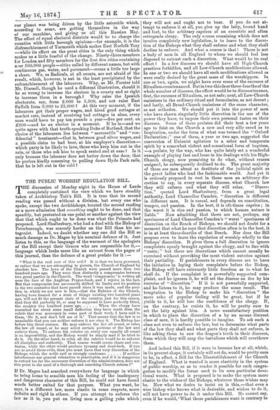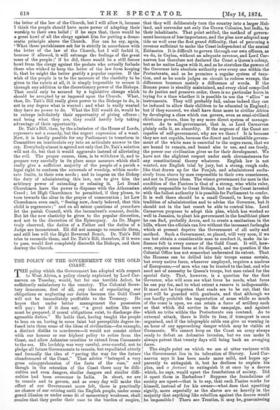THE PUBLIC WORSHIP REGULATION BILL.
"What is the real root of this evil ? It is that we have governed, or rather that we are attempting to govern, the Church of England by obsolete law. The laws of the Church were passed more than two hundred years ago. They were then distinctly a compromise between two great parties in the Church. The word 'compromise' is written all over the face of the Anglican Prayer-book, and I rejoice in the fact. But that compromise has necessarily shifted its limits and its position in the two centuries that have passed since it was made, and the posi- tion in which we are now is this,—that the Rubrics of the Church, having been framed for a state of things existing two hundred years ago, will not fit the present state of the country, just for this reason, that they did perfectly fit, or may be supposed to have perfectly fitted, the country two hundred years ago When the clergy have consulted me about some small deflection they have made from the rubric that was necessary in some part of their work, I have said to them. 'Do it, and don't tell me of it.' That means that the law is so unsuitable that you can neither enforce it nor obey it. The Bishop has before him three courses. He may enforce the law all round, or relax the law all round, or he may select certain portions of tho law and enforce them. To enforce the rubrics on every one equally all round is an impossibility, and tho Bishop would be simply mad if he tried to do it. On the other hand, to relax all the rubrics would be to subvert all discipline and authority. That course would create chaos and con- fusion, while the other would produce tyranny and dead-lock. If you are to avoid theso evils, then you must have that very discretion of the Bishops which the noble earl so strongly condemns. If neither interference nor general relaxation is practicable, and if it is dangerous to extend too far the necessary discretion of the administrators, does not this point to the need of a thorough and searching Church reform ?"
If Dr. Magee had searched everywhere for language in which to bring home to sensible men his feeling of the inadequacy and dangerous character of this Bill, he could not have found words better suited for that purpose. What you want, he says, is a different law, more elastic in some respects, more definite and rigid in others. If you attempt to enforce the law as it is, you put on living men a galling yoke which they will not and ought not to bear. If you do not at- tempt to enforce it at all, you give up the laity, bound hand and foot, to the arbitrary caprices of an eccentric and often retrograde clergy. The only course remaining which does not involve completely new legislation, is to leave to the discre- tion of the Bishops what they shall enforce and what they shall decline to enforce. And what a course is that ! There is not a body of men in all England to whom we should feel less disposed to entrust such a discretion. What would be its real effect ? In a few dioceses we should have all High-Church practices forbidden, and all Low-Church modifications allowed. In one or two we should have all such modifications allowed as were really desired by the great mass of the worshippers. In one or two, again, we might have even some of the excesses of Ritualism counten anced. But in two-thirds or three-fourths of the whole number of dioceses, the effect would be to discountenance, first, the excesses of Ritualism, as not safe; next, all Low-Church omissions in the ordinary ritual and formularies, as not decent ; and lastly, all Broad-Church omissions of the same character, as not orthodox. We should put it into the power of men who have shown singularly little discretion in the use of the power they have, to impose their own personal tastes on their dioceses. Some of these prelates did their best a few years ago to foist on the Church a new and very silly creed as to Inspiration, under the form of what was termed the "Oxford Declaration ;" one of them, a year or two ago, suggested the conversion of Unionist agitators to a sober and temperate spirit by a somewhat violent and sensational form of baptism, —a prelate, by the way, who has quite lately set a wonderful example of playing fast and loose in his dealings with his High- Church clergy, now promising to do what, without reason assigned, he subsequently declined to do. The great majority of them are men about as destitute of the judicial spirit as the great ladies who lead the fashionable world. And yet it is seriously proposed to vest in these men an arbitrary dis- cretion to say, in every separate diocese, what Church law they will enforce and what they will relax. "Discre- tion," quoted Lord Shaftesbury, from a great legal authority, Lord Chancellor Camden, "discretion is different in different men. It is casual, and depends on constitution, temper, and passion. In the best, it is oft-times caprice ; in the worst it is vice and passion, to which human nature is liable." Now admitting that there are not, perhaps, any specimens of Lord Chancellor Camden's " worst " specimens of discretion on the Bench of Bishops, we should not doubt for a moment that what he says that discretion often is in the best, it is in at least three-fourths of that Bench. Nor does the Bill propose even to leave the regulation of worship wholly to the Bishops' discretion. It gives them a full discretion to ignore complaints openly brought against the clergy, and to fine with " costs; " but these are discretions which cannot usually be exercised without provoking the most violent outcries against their partiality. If parishioners in every diocese are to have the initiative in laying their complaints before the Bishop, the Bishop will have extremely little freedom as to what he shall do. If the complaint is a powerfully supported com- plaint, and he ignores it, he will set the diocese on fire by his exercise of "discretion." If it is not powerfully supported, and he listens to it, he may produce the same result. The temptation to the Bishop to make his "discretion " the mere echo of popular feeling will be great, but if he yields to it, he will lose the confidence of the clergy. If, on the contrary, he resists it, he will be pretty sure to set the laity against him. A more unsatisfactory position in which to place the discretion of a by no means discreet class of men, it is hardly possible to imagine. To ask such a class not even to enforce the law, but to determine what parts of the law they shall and what parts they shall not enforce, is like asking them to sow the dragon's teeth in their dioceses, from which they will reap the battalions which will overthrow them.
And indeed this Bill, if it were to become law at all, which, in its present shape, it certainly will not do, would be pretty sure to be, in effect, a Bill for the Disestablishment of the Church of England. What is wanted is more elasticity in the system of public worship, so as to render it possible for each congre- gation to modify the forms used to its own particular devo- tional wants. What is proposed is to make the system more elastic to the wishes of the Bishops, whatever those wishes may be. Now what we desire to insist on is this,—that even a wise bishop who knows what is desirable, and wishes to do it, will not have power to do it under this Bill. He cannot say, even if he would, 'What these parishioners want is contrary to
the letter of the law of the Church, but I will allow it, because I think the people should have more power of adapting their worship to their own belief ;' if he says that, there would be a great howl of all the clergy against him for putting a demo- cratic principle above the Church. Nor can he say, again, 'What these parishioners ask for is strictly in accordance with the letter of the law of the Church, but I will forbid it, because if allowed, it will estrange the feelings of the great mass of the people ;' if he did, there would be a still fiercer howl from the clergy against the prelate who actually forbade those who wished to keep the letter of the law from keeping it, that he might the better gratify a popular caprice. If the wish of the people is to be the measure of the elasticity to be given to the rubric at all, it is simply impossible to secure it through any addition to the discretionary power of the Bishops. That could only be secured by a legislative change which should be accepted by or imposed upon the Church. What, then, Dr. Tait's Bill really gives power to the Bishops to do, is not in any degree what is wanted ; and what is really wanted they have no power to do. What the Bill would do, would be to enlarge indefinitely their opportunity of giving offence ; and being what they are, they could hardly help taking advantage of their opportunity.
Dr. Tait's Bill, then, by the admission of the House of Lords, represents not a remedy, but the urgent expression of a want. Now, it is hardly possible for any Parliament to transform in Committee an inarticulate cry into an articulate answer to the cry. Everybody almost is agreed not only that Dr. Tait's solution will not do, but that it would aggravate instead of alleviating the evil. The proper course, then, is to withdraw it, and to prepare very carefully in its place some measure which shall really give a sufficient majority of the people of a parish a legal right to conform the externals of worship, within mode- rate limits, to their own needs ; and to impose on the Bishop the duty of administering this law, not to give him the arbitrary power of extending or relaxing it. Let Broad - Churchmen have the power to dispense with the Athanasian Creed ; let High Churchmen be permitted, if they please, to turn towards the altar in the prayer of consecration ; let Low Churchmen even omit, "Seeing now, dearly beloved, that this child is regenerate;" and on all minor questions of procedure let the parish Council, with the incumbent's consent, decide. But let the new elasticity be given to the popular discretion, and not to the discretion of the Episcopacy. As Dr. Magee truly observed, the duties of a Father and the duties of a Judge are inconsistent. Eli did not manage to reconcile them, and still less will the Right Reverend Bench. Dr. Tait's Bill tries to reconcile them, and Dr. Tait's Bill, therefore, if it were to pass, would first completely discredit the Bishops, and then destroy the Church.



































 Previous page
Previous page